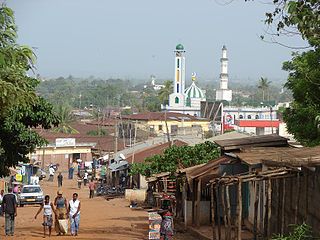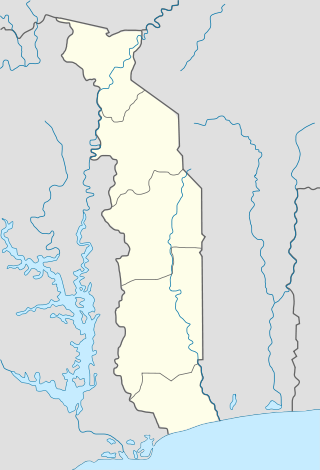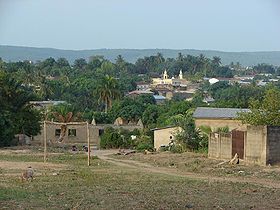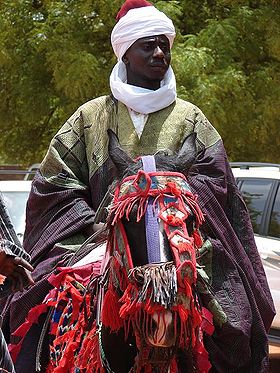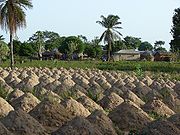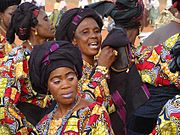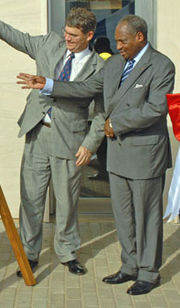
Sokodé
About this schools Wikipedia selection
The articles in this Schools selection have been arranged by curriculum topic thanks to SOS Children volunteers. Sponsoring children helps children in the developing world to learn too.
| Sokodé | |
|---|---|
| A mosque in Sokode | |
|
|
|
| Coordinates: 8°59′N 1°08′E | |
| Country | |
| Region | Centrale Region |
| Prefecture | Tchaoudjo |
| Population | |
| • Total | 113,000 |
Sokodé is the second largest city in Togo and seat of the Tchaoudjo and Centrale Region in the centre of the country, 339 kilometres (211 mi) north of Lomé. With a population of 86,500 (2004), currently at around 113,000, the city is situated between the Mo and Mono rivers, and it is a commercial centre for the surrounding agricultural areas. It is a multi-ethnic and multi-religious city, but is dominated by Islam.
History
Old indigenous strains of the region are mixed in a first-time immigrants Gurma, from the eastern part of the Niger Bend, between Ouagadougou and Niamey, which brought into the political chiefdoms. In this structure, traders and craftsmen Sudan (the Mandinka, from historic Mali) and Hausa added from the 16th century a dynamic force, which will be the success of the city: Islam , and with it the sense of cases related to trade relations. By choosing in late 1897, to install a post Sokodé, Germans endorse the role of such chefferies Kotokoli.
The city has thus developed in precolonial times as a commercial crossroads on the road to the cola between Ghana and Benin, and now as a place of passage on the only road north-south Togo, linking the capital Lome in Burkina Faso. Urbanization has accelerated during the colonization. The city consists of ancient villages have now become real neighborhoods. Its growth has also been the work of entire villages that had approached the city and intercity migration.
Sokodé is still handled by the City complementary and traditional chiefs. Historically, the Chiefs of various villages were included in a leadership supreme, Tchaoudjo. At each change of reign, the new sovereign was to be taken, in turn, in another place (always among the constituent villages, seven). These are the Tchalo of Daro, a village south of Sokodé, who were responsible for the choice of new leaders. Muslims Didaouré remained out of this political construction, and enjoy broad autonomy, led by a leader of Muslims (uro-MALWA), always from the patronymic group tour and under the direct responsibility of the supreme leader. Today, the head of Komah assumes the supreme role.
Geography
Sokodé is characterized by a dense network of rivers and relief hills. The two main rivers are the Kpondjo and Kpandi, which flow into the Na. The latter resulted in the Mono River. The border between the Mono and the Volta River drainage basins is located a few kilometers north of the city. It is now in the catchment of the river Mô.
Demographics
Sokodé is the city with the highest proportion of Muslim population of Togo. 70% of the population is Muslim, 30% were Christians, mostly Catholics. Sokodé is home to the Tem people and most people in Sokodé speak Kotokoli (or tem). The ethnonym Kotokoli is the name that was given to these speakers by traders of the Niger Bend. Many other languages are spoken in Togo, especially ewé, the dominant language of the south, and Kabyé, dominant language of the Kara region, further north. The Kotokoli and Kabyè languages are closely related.
From the standpoint of habitat, we can divide the city into two parts: the center, with a very high density housing, traditional, and the suburbs, housing less and less dense as one moves away from the centre. Modern materials have been increasingly replacing traditional materials ( mudbrick) if it follows the same progression.
Climate and economy
Located at an average altitude of 340 m, midway between the ocean and the Sahel strip, Sokodé enjoys tropical climate, with two marked seasons: the rainy season, which lasts from April to October, with a peak from July to September and the dry season from November to March. The rainfall is between 1,200 and 1,500 mm per year and the number of rainy days varies between 100 and 130. The average temperature is 26 °C (1961-1990). The evaporation is high, estimated at 1500 mm / year, and is particularly marked in harmattan period from November to January. The humidity is very variable, and depends on all the above factors.
Today, the economy Sokodé is dominated by transport, trade and handicrafts. There is no industrial activity. Farmers grow primarily corn, cassava, yams, pepper and beans, and many gardeners and farmers live on the periphery of Sokodé. The farmers are for the most part of the ethnic peule. Peuls Many have settled around Sokodé. They have herds of cows in the fields. Meanwhile, Fulani nomads frequently pass near Sokodé, with their herds of zebu en route between Burkina Faso and Nigeria.
The vegetables are grown especially along the rivers Kpondjo and Inusayo. Most areas of gardening are floodplains; with growers beginning to cultivate after the rainy season.
Culture
Landmarks
- Sokodé Old Grand Mosque
- Sokodé Airport.
Festivals
'Gadao-Terraced-Kosso': The Day Kotokoli. Three days of festivities, from Friday to Sunday. Celebrated the eve affiliations, Gadao's function is to thank the ancestors for abundant harvests. Terraced, or Feast of knives, is a festival of discovery dating back to semassiwarriorswho were exercising their power and bravery in undergoing tests forces. The next day Kosso place, the party of women, as these come in on the ground Sokodé City. In 2008, this celebration took place in late March.
Among others, major festivals are held by different Sokodé clans . In most festivals traditional dancers are invited in the region, as well as riders mimicking the Semassi warriors, spinning at full speed in the middle of the crowd.
Sport
The town is home to AC Semassi F.C. who play at the Stade Municipal as do the Tchaoudjo Athlétic Club.
Notable people
- Kotokro - the founder of Sokodé.
- Zarifou Ayéva -politician
- Mohamed Kader -footballer
- Edem Kodjo - former Prime Minister of Togo
- Assimiou Touré -footballer
